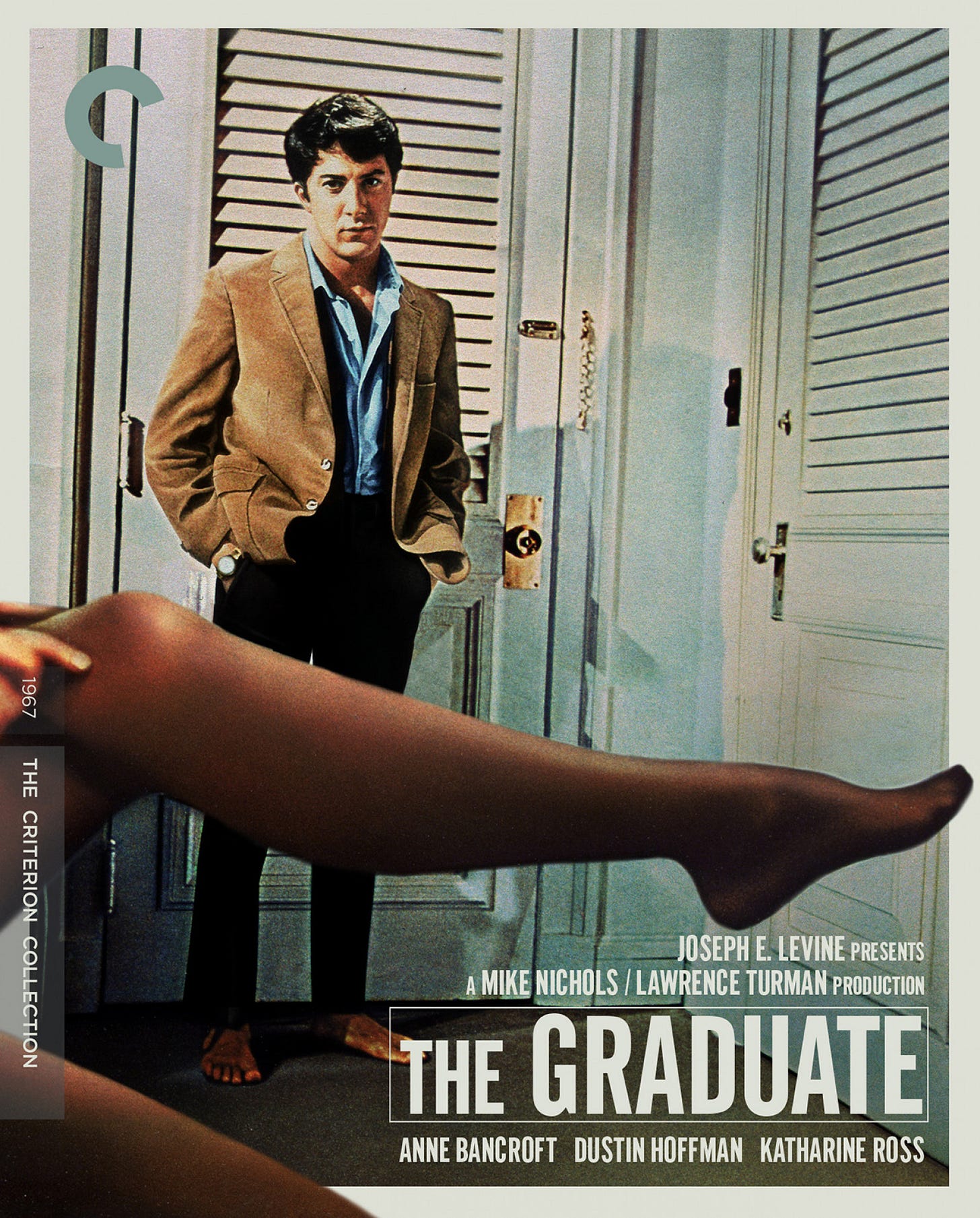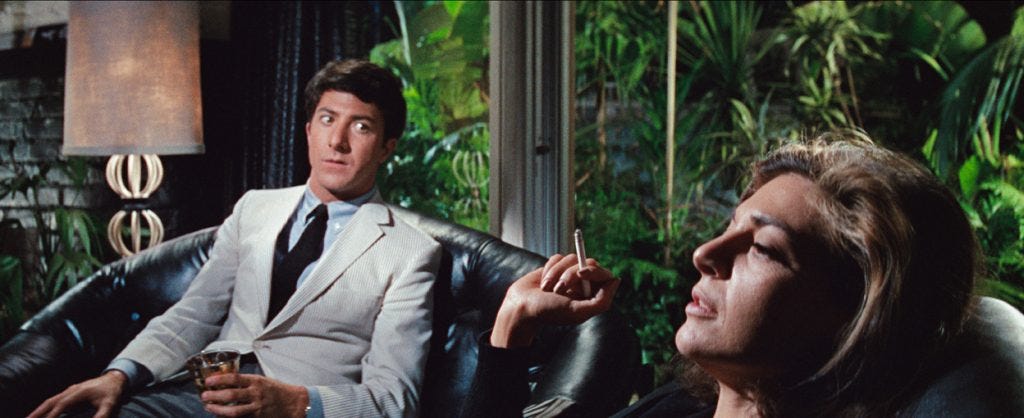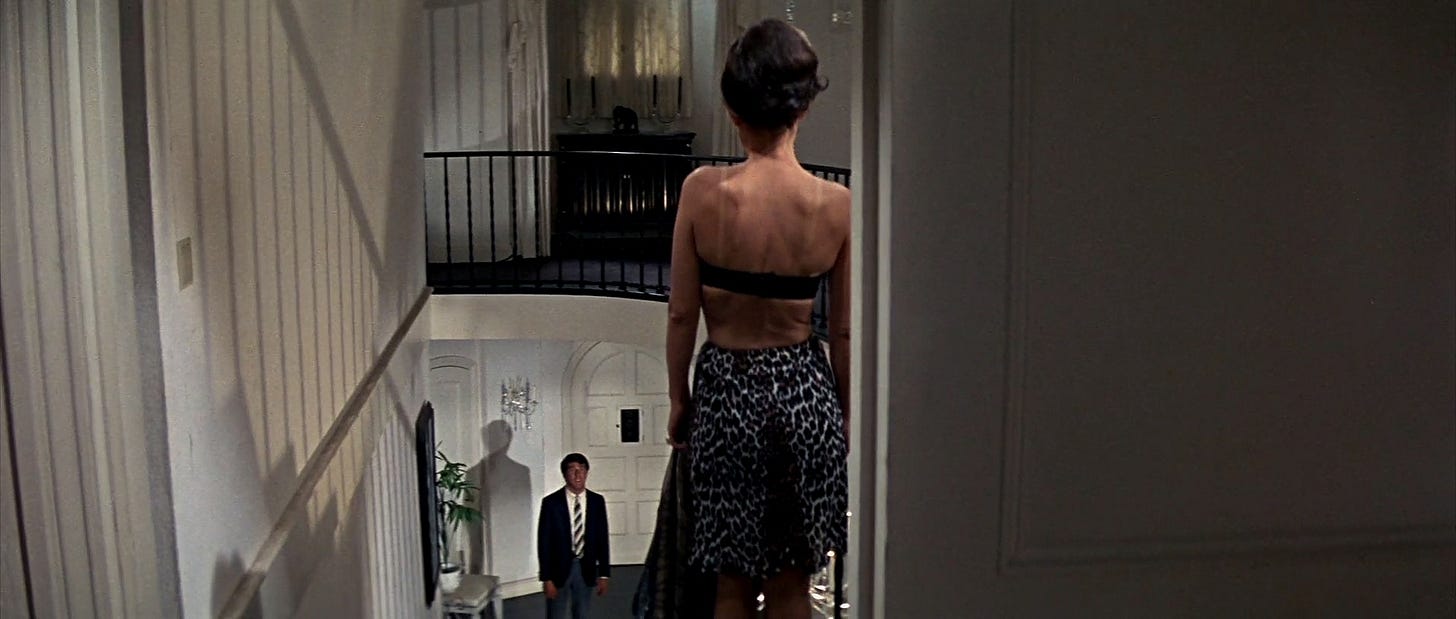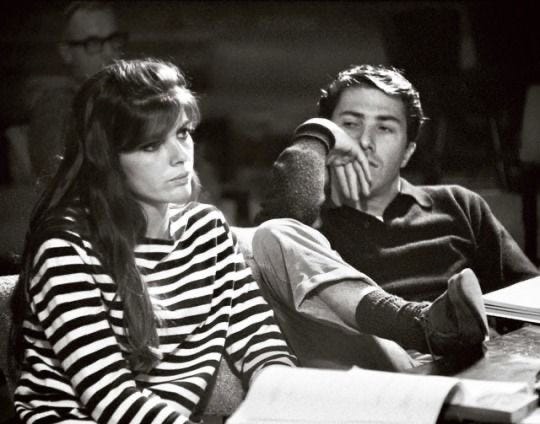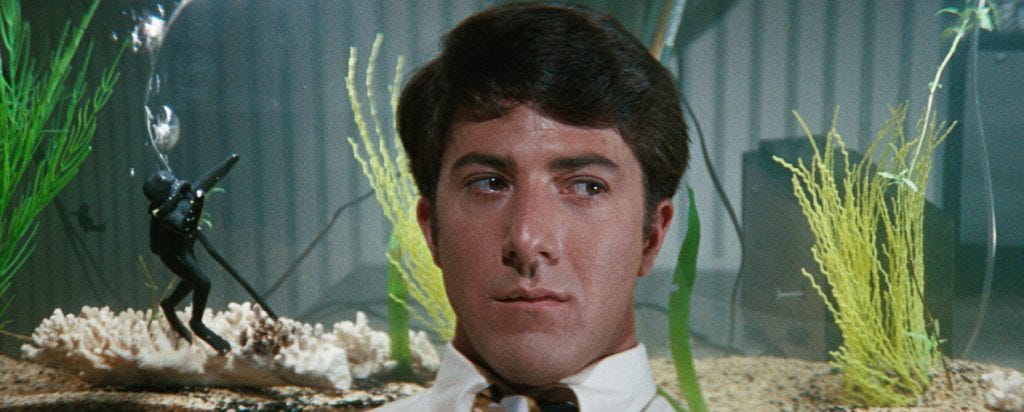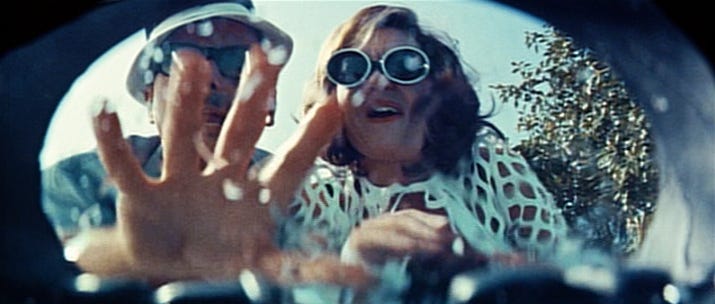Revisiting The Graduate
Coming from someone with absolutely zero credentials
Surprise! As of this week, I am officially a Uni Graduate. After years of endless suffering, I am finally able to leave it all behind, and honestly, I’m feeling more lost than ever. With that off my chest, what better way to celebrate this huge milestone than talking about one of my all-time favourite films that somehow happens to cover this strange stage in life so very perfectly, The Graduate (1967)?
Now, I sincerely hope that anyone reading this has seen the movie at one point or another. Firstly, because it’s a life-changing experience if I do say so myself. But also, there will be spoilers, obviously. You’ve hereby been warned. To start things off, I’ll give you some context: The Graduate (1967) was actually based on a 1963 novel by Charles Webb. Back then, Webb sold the rights to his story for approximately $1000. Though it was released to cinemas on the 20th of December 1967, it quickly became the highest-grossing film that year. I’d say that this is one of the few cases in which there’s a very good reason for the film’s major success over the book – its cinematography and Dustin Hoffman’s performance bring the story and its deeper meaning to life in a way that its source material simply couldn’t, but I’m getting too far ahead of myself.
Another thing worth mentioning is that, in my humble opinion, The Graduate (1967) boasts the greatest movie soundtrack of all time (yes, I really mean it). For one of his earliest directorial works, Mike Nichols chose to incorporate multiple already-released songs by Simon & Garfunkel. From his own account, Nichols shot and edited the movie without specific melodies in mind. During the production process, the director was gifted a copy of the folk-rock duo’s Parsley, Sage, Rosemary and Thyme by his brother. He listened to the record each and every morning and chose to put a song of theirs over a scene to test it out – to his surprise, it was a perfect fit. In addition to the four existing songs, Nichols asked the duo to also create an original track. They pitched their one and only idea to him, however, he wasn’t impressed and requested a different one. After some whispering, Paul Simon and Art Garfunkel presented their then-unreleased song “Mrs. Roosevelt” to the director and merely changed the name to “Mrs. Robinson” – Mike Nichols loved it! And just like that, one of the most recognizable songs of our time was born. Even just in that context, I’d say that the creation of The Graduate served a great purpose, right? I’ll get back to the musical aspect of the movie later on, but first, we’ll need a bit of context.
So, let’s do a brief summary to get everyone on board. Our story revolves around Benjamin Braddock (Dustin Hoffman) who is, you guessed it, a recent College Graduate. Upon earning his bachelor’s degree, 21-year-old Benjamin returns to his parents’ home for the summer, uncertain about his future and feeling alienated from the adult world. In the midst of his spiralling, Benjamin is seduced by Mrs. Robinson (Anne Bancroft), an older woman who is the wife of his father’s business partner. After initially rejecting her advances, Benjamin eventually gives in and the two begin a secret and purely physical affair. Not knowing how to navigate this time in his life, Benjamin spends his days drifting away in his family’s pool and meeting Mrs. Robinson at the local hotel at night. However, things take a dramatic turn when Benjamin is set up on a date with Elaine (Katharine Ross), Mrs. Robinson’s daughter. They eventually fall in love which, given his prior affair with Elaine’s mother, obviously leads to a dramatic series of events. The culmination of the movie takes place during a chaotic wedding ceremony, where Benjamin tries to prevent Elaine from marrying someone else. It ends with Benjamin and Elaine escaping the church, though their future remains uncertain. Obviously, this summary simplified the plot immensely. The film explores a variety of themes including consumption, love and the generation gap – but more on that later.
A pivotal part of The Graduate that also sets the tone for the entire movie is its opening sequence. It starts out with a close-up of an expressionless Benjamin Braddock inside a plane. A few seconds in, it cuts to our protagonist standing on a moving walkway at the Los Angeles International Airport while Simon & Garfunkel’s“The Sound of Silence” starts playing – more specifically, its opening line “Hello darkness, my old friend”. Multiple things hint at the isolation and disconnection between Benjamin and the world around him – one of them being his proper suit which stands in contrast to the casual attire worn by those around him. Furthermore, he stands still on the moving sidewalk as other people pass him, symbolizing Benjamin’s current state of mind as he moves through life passively. Instead of actively making his own decisions, Benjamin lets himself be carried by societal expectations. Now, I might be biased but I love the symbolism in this specific scene and the way it foreshadows Benjamin’s acts of rebellion later on in the movie. Granted, maybe some parts are a bit too on the nose, but I am a fan regardless.
We talked about the opening scene, now let’s do the only plausible thing in this scenario: skip the middle part and jump directly to the ending sequence (Trust me, it’ll make sense… I think). After a whole lot of back and forth in the love department, the movie finally reaches its climax when Benjamin enters the church where Elaine is about to exchange vows with a different man – one her parents actually approve of. As Benjamin tries to get Elaine’s attention chaos erupts and without spoken dialogue, the two lock eyes and decide to flee the ceremony together. They push past the shocked angry guests and escape into the back of a waiting bus. In the movie’s final few moments, the camera focuses on the faces of Benjamin and Elaine as their initial excitement turns into a sense of uncertainty following that impulsive decision. Just like in the opening scene, Simon & Garfunkel's “The Sound of Silence” starts playing again – thus reinforcing the very same theme of isolation and introspection. The song therefore acts as a sort of frame for the entire film.
Regarding that scene in particular there’s actually a fun piece of background info that, in my opinion, makes it even better. So, apparently, all throughout the filming process Mike Nichols was extremely kind to Dustin Hoffman and Katharine Ross, who were both fairly new to the acting industry at this point in time. In order to shoot the bus scene, though, the police had to stop the traffic in numerous parts of the city – meaning Nichols was under quite a bit of time pressure to get it right on the first take. Due to the stress, this was the first time he snapped at the young actors. On his own account, this left Hoffman and Ross terrified which is ultimately visible in the outcome. Initially, the scene was supposed to end with Benjamin and Elaine smiling in the back of the bus, however, the camera kept rolling and caught their real reactions as they shifted between looking excited and concerned. Nichols actually loved the unplanned result and thought it gave the end an even deeper meaning.
The Graduate is extremely rich in themes and symbolism which can be seen as a reflection of the 1960s but simultaneously are also sort of timeless in the life of a young adult. As I hinted toward in the context of both its opening and its closing scene, the film centres heavily around alienation and disconnection from others and the materialistic and confirmative values of the older generation. Materialism and consumerism are some main points of criticism the film makes to distinguish between the younger and older generation. With its setting in upscale suburban California, the movie plays into the consumerist culture of the time – opulent homes, expensive cars and country club scenes all reinforce the idea of a society obsessed with material possessions and status. Benjamin’s questioning of those values represents an act of rebellion, not only his own but also that of the baby boomer generation as a whole. Admittedly though, his behaviour tends to be quite hypocritical at times (take Benjamin’s rejection of materialism all while driving the expensive sports car his parents bought him for instance).
As the film follows the process of an affair, it also focuses on themes like sexuality, seduction and temptation. In doing so The Graduate delves into the aspect of Benjamin’s sexual awakening and furthermore explores societal taboos. Getting into all of that would probably take up way too much time but at least you’re aware of the obvious now. To end this section, I’m going to shine a light on one last recurring symbol throughout the movie: water. Be it a shot past a fish tank, of Benjamin drifting on a pool float or a scene in which he’s in a scuba diver suit and literally gets pushed underwater by his parents – water imagery undoubtedly has a deeper meaning in The Graduate. Interestingly enough, some alternative movie posters feature the family’s pool in opposition to the iconic arched leg scene we commonly associate with it. But why is water such an important part of The Graduate? Well, in my (and many others) opinion it once more symbolises Benjamin’s uncertainty and disconnection in life as he is often seen drifting aimlessly and not being able to reach the surface. In an article for the Directors Guild of America Nichols was quoted saying:
I always wanted to leave as much water in the frame as I could because it was about the nowhereness of Benjamin’s experience.
Attention as I’m going to state the obvious: at this point in my life, I sort of relate to Benjamin Braddock. Do I hate myself for it? Yes, absolutely. If you watched the movie (which I hope you did), you’re surely aware of the not-so-admirable parts of our dear protagonist. However, as I can fully acknowledge that he is insufferable (and borderline creepy) at times, I also weirdly find myself rooting for him throughout the film. The contradicting perception of Benjamin is going to be the topic in just a second but firstly I felt the need to clarify that my self-proclaimed sense of similarity to him stems solely from the feeling of confusion and uncertainty – not so much his stalker vibes, obviously. Okay, moving on.
Taking old reviews and people’s personal memories into account, it seems rather clear: depending on the age they're at when watching The Graduate, people have an entirely different perception of both Benjamin and the movie’s message as a whole. As a 20-something-year-old (like myself) it’s quite common for the viewer to relate to and even sympathize with our protagonist. I’ve often seen comparisons being made to the character of Holden Caufield in J. D. Salinger's The Catcher in the Rye (Though admittedly, Holden always irritated me, even upon first reading the novel). It exhibits the same phenomenon of an admired protagonist who appears more and more insufferable as the viewer grows older. So, in a way, it can be seen as a real-life portrayal of that same generation gap that is also depicted in the movie, can’t it?
And with that being said, we made it to the end. This leaves us with the age-old question: what was it all for? Unfortunately, I don’t exactly have an answer to that. I suppose we touched upon a few different topics – symbolism, personal perception and of course the soundtrack. Listen, this entry obviously wasn’t designed to be a major deep dive into the movie. Although, I have no doubt that I’d be able to properly focus on any of the given aspects to a great extent – in fact I basically take any and every opportunity to give The Graduate a rewatch at this point in my life. So I guess there we have it: my one and only goal was to openly talk about a movie I simply can’t ever shut up about – and to your misfortune, you were the recipient of it all. Sorry about that. I mean hey, maybe in ten or even twenty years’ time, I’ll revisit The Graduate with an entirely different opinion on the message and its characters just like so many people before me did. Who knows? But until then, I’m simply going to keep loving the film in all its glory. The end.


